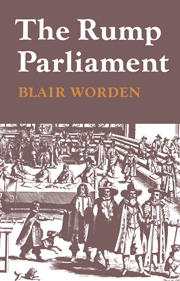Book contents
- Frontmatter
- Contents
- Dedication
- Acknowledgements
- Author's Note
- List of abbreviations
- Introduction
- PART ONE THE RUMP AND THE RUMPERS
- PART TWO THE RUMP AND REFORM
- PART THREE THE STRUGGLE FOR SURVIVAL, FEBRUARY 1649–SEPTEMBER 1651
- 9 Problems and policies, February 1649
- 10 The pursuit of respectability, February–August 1649
- 11 The nadir, September 1649–September 1650
- 12 Dunbar to Worcester: the coalition under strain, September 1650–September 1651
- PART FOUR PARLIAMENT versus THE ARMY, SEPTEMBER 1651–APRIL 1653
- PART FIVE THE DISSOLUTION OF THE RUMP
- APPENDICES
- Bibliographical Guide
- Index
12 - Dunbar to Worcester: the coalition under strain, September 1650–September 1651
Published online by Cambridge University Press: 29 January 2010
- Frontmatter
- Contents
- Dedication
- Acknowledgements
- Author's Note
- List of abbreviations
- Introduction
- PART ONE THE RUMP AND THE RUMPERS
- PART TWO THE RUMP AND REFORM
- PART THREE THE STRUGGLE FOR SURVIVAL, FEBRUARY 1649–SEPTEMBER 1651
- 9 Problems and policies, February 1649
- 10 The pursuit of respectability, February–August 1649
- 11 The nadir, September 1649–September 1650
- 12 Dunbar to Worcester: the coalition under strain, September 1650–September 1651
- PART FOUR PARLIAMENT versus THE ARMY, SEPTEMBER 1651–APRIL 1653
- PART FIVE THE DISSOLUTION OF THE RUMP
- APPENDICES
- Bibliographical Guide
- Index
Summary
Dunbar was celebrated by the Rump as a miraculous deliverance. Unhappily it did nothing to lighten the burden of taxation, which like the government's indebtedness continued to soar; but the threat from Scotland, although by no means extinguished, was now at least in temporary abeyance. As Cromwell wrote to Heselrige the day after the battle, ‘it's probable the kirk has done their do’. The consequent euphoria among English radicals aroused once more the reforming ambitions which had lain dormant in the previous months. Cromwell himself gave the lead. George Fox claimed later that ‘O.C. at Dunbar fight had promised to the Lord that if he gave him the victory over his enemies, he would take away tithes, etc.’; and on the day after the battle, in a letter to Speaker Lenthall, Cromwell exhorted parliament to ‘relieve the oppressed’ and to ‘hear the groans of poor prisoners in England; be pleased to reform the abuses of all professions; and if there be any one that makes many poor to make a few rich, that suits not a Commonwealth’. The House was again instructed to ‘relieve the Oppressed’ in a thanksgiving sermon delivered by Thomas Brooks on 8 October. It was in the autumn of 1650 that the Rump made its most important concessions to reforming sentiment. Yet radical success was short-lived, and reform quickly provoked reaction. The overall effect of the year between Dunbar and Worcester, indeed, was to strengthen still further the Rump's inclination to woo both political and religious presbyterians.
- Type
- Chapter
- Information
- The Rump Parliament 1648–53 , pp. 237 - 262Publisher: Cambridge University PressPrint publication year: 1974



